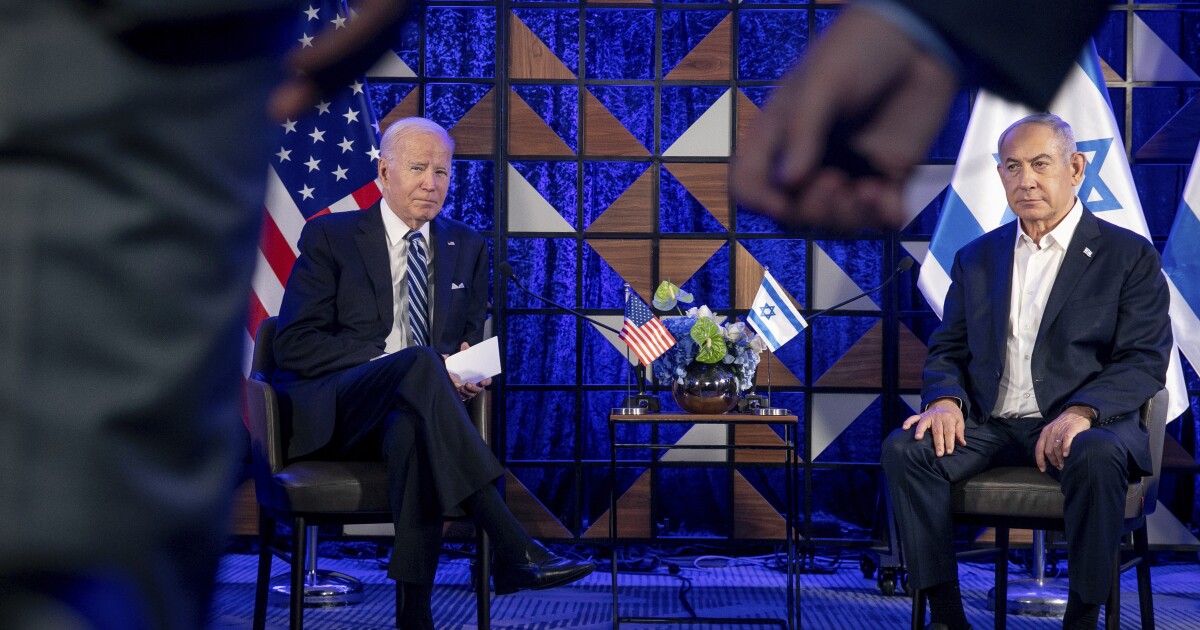

President Joe Biden‘s staunch support for Israel following Hamas‘s deadly Oct. 7 terrorist attacks has splintered the Democratic Party despite the president’s recent attempts to distance himself from Israeli Prime Minister Benjamin Netanyahu‘s military operations in Gaza.
Biden and Netanyahu’s relationship spans decades, dating back to Biden’s time as a young senator from Delaware. The two men first encountered each other while Netanyahu served in Israel’s American Embassy in Washington before being tapped to be Israel’s ambassador to the United Nations.
DID JACK SMITH’S SEARCH WARRANT SWEEP TWITTER DATA FROM MILLIONS OF AMERICANS?
Though they have disagreed on policy throughout the years, Biden’s recent support for Israel in its war against Hamas largely echoes the pro-Israel stance he has held for the past five decades.
“They’re never going to be personal, best friends. It’s not the nature of the relationship. But at the same time, the personal connection to Israel is what keeps it going,” William Wechsler, the Atlantic Council’s senior director of Middle East Studies, said shortly after the Oct. 7 attacks. “They really can’t caricature each other. They will work together when needed but will also be clear when there is a disagreement.”
The two certainly disagreed while Biden served as vice president and was lobbying for former President Barack Obama‘s nuclear deal with Iran.
Then, Netanyahu, an opponent of the deal, went around the White House and delivered a fiery speech to Congress, telling lawmakers the world would be “better off without it.”
“He’s been a friend for over 30 years,” the then-vice president said in response to Netanyahu’s congressional address. “I said, ‘Bibi, I don’t agree with a damn thing you say, but I love you.'”
The Biden-Bibi love-hate relationship has continued throughout Biden’s time as commander in chief.
The president voraciously opposed Netanyahu’s attempts at reforming Israel’s court system earlier this year, prompting the Israeli prime minister to rebuke his pal in Washington subtly.
“Israel is a sovereign country which makes its decisions by the will of its people and not based on pressures from abroad, including from the best of friends,” he said of Biden’s criticism of his proposed judicial reforms.
Still, the Biden administration has backed Israel’s attempts to root Hamas and other Islamic militant groups out of Gaza despite increasing pressure from Democrats in and out of government to push Netanyahu to end the bombardment of civilian targets, especially hospitals, arguing that such strikes violate international law.
The Biden administration, specifically National Security Council spokesman John Kirby, national security adviser Jake Sullivan, White House press secretary Karine Jean-Pierre, and the president, has resisted those calls, mourning the loss of civilian life while defending Israel’s military operations in the region.
However, in recent weeks, Biden has appeared to open up some daylight between himself and his Israeli counterpart.
Following the brokered temporary ceasefire and hostage exchange between Israel and Hamas, the president told reporters it took “a little longer than I hoped” for Netanyahu to get on board with pausing the fighting.
Biden also suggested earlier this week that preconditioning future military aid to Israel was a “worthwhile thought,” though administration officials quickly told reporters that no such conversations were taking place.
And reports indicate that U.S. officials have stressed to their Israeli counterparts that the United States will not support the Israel Defense Forces operating in southern Gaza the same way as in the north once this temporary ceasefire resumes. Axios reported that Biden issued such a warning to Netanyahu after the initial ceasefire agreement was reached.
Still, Biden’s strong support for Netanyahu and Israel’s campaign against Hamas continues to cause cracks in his electoral coalition.
American Muslim and Arab support for the president has plummeted, especially in Michigan. Georgia and Arizona, also important battlegrounds heading into the 2024 election cycle, similarly have relatively high Arab and Muslim populations.
That sense of dissatisfaction has driven sweeping, pro-ceasefire protests across the country. One incident in mid-November saw police actively confront roughly 150 protesters outside of the Democratic National Committee headquarters in Washington. Those protesters claimed they wanted to press DNC staffers and House Minority Leader Hakeem Jeffries (D-NY), who was inside the building, to turn up the heat on Biden regarding a protracted ceasefire.
Protesters also picketed Biden’s attendance at the memorial funeral service for former first lady Rosalynn Carter in Georgia earlier this week.
Sen. Bernie Sanders (I-VT) buoyed those voices in an opinion piece for the New York Times on Nov. 22, just days after the Israel-Hamas hostage deal was announced, in which he called for “an immediate end to Israel’s indiscriminate bombing.”
Meanwhile, some of Biden’s top legislative allies, including those from his home state of Delaware, have become more vocal in recent days about monitoring future support for Israel’s military.
“There are conditions that are already attached to our aid to a wide range of countries,” Sen. Chris Coons (D-DE) said this week on Fox News. “The conditions that already apply under law are sufficient for this circumstance.”
“We regularly condition our aid to allies based upon compliance with U.S. law and international law,” Sen. Chris Murphy (D-CT) added in an interview on CNN. “It’s very consistent with the ways in which we have dispensed aid, especially during wartime, to allies.”
And following a caucus luncheon on Tuesday, Senate Majority Leader Chuck Schumer (D-NY), who had stood lockstep with Biden’s Israel policy, told the Washington Examiner that “there are different views on that, and we’re going to have to have a discussion with the caucus and the administration.”
Sanders also specifically called for conditioning future Israel aid in his op-ed.
CLICK HERE TO READ MORE FROM THE WASHINGTON EXAMINER
“Mr. Netanyahu has made clear where he stands on these critical issues. So should we. If asking nicely worked, we wouldn’t be in this position. The only way these necessary changes will happen is if the United States uses the substantial leverage we have with Israel. And we all know what that leverage is,” he wrote. “For many years, the United States has provided Israel substantial sums of money — with close to no strings attached. Currently, we provide $3.8 billion a year. President Biden has asked for $14.3 billion more on top of that sum and asked Congress to waive normal, already-limited oversight rules. The blank check approach must end.”
Emily Jacobs contributed to this report.





